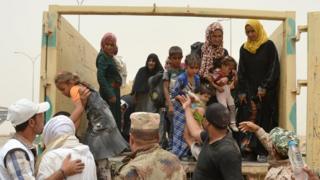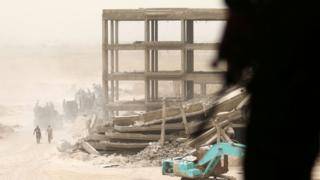

An illumination round blazes in the night sky over Fallujah as U.S. artillery bombards the city ahead of a new advance by Marines and Iraqi forces

Masked guerrillas on the streets of Mosul after firing a rocket-propelled grenade during clashes with U.S. and Iraqi forces Wednesday. U.S. commanders believe many insurgent leaders may have escaped Fallujah, and are launching new attacks in a number of cities from Baghdad to as far north as Mosul

A U.S. soldier fires on an enemy sniper position in the course of a U.S.-Iraqi operation to wrest control of the city back from insurgents

A member of Charlie Company of the U.S. Marines First Division, Eighth regiment, takes a smoke break in Fallujah Tuesday, after U.S. forces punched their way into the center of the insurgent-held town

An Iraqi officer salutes interim Prime Minister Ayad Allawi during his visit to Iraqi troops on the frontline at Camp Fallujah, Monday

Marines carry a wounded comrade to a helicopter near Falluja, Wednesday, as U.S. troops made rapid progress in their battle to recapture the city from insurgents

Soldiers from the 1st U.S. Marines Expeditionary Force, 1st Battalion, 3rd Marines Regiment, Bravo Company hold a suspected insurgent captured during the ground offensive to retake Fallujah

U.S. soldiers catch a brief nap in the master bedroom of a local house commandeered during fighting in Fallujah, Wednesday





